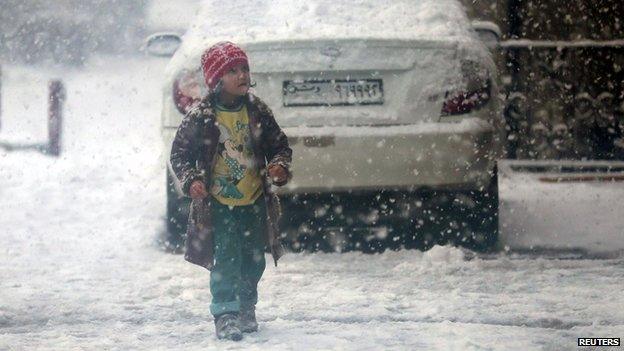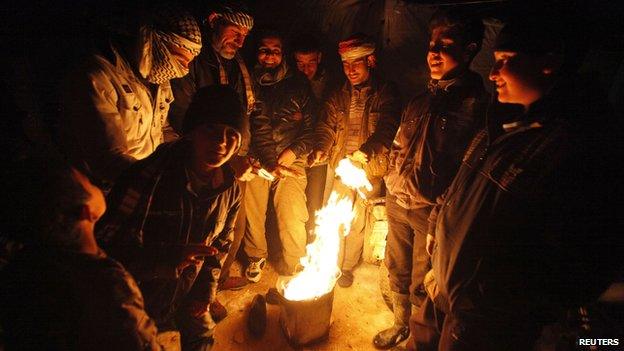Syria crisis: UN launches record $6.5bn aid appeal
- Published
- comments
The BBC's Jim Muir reports on winter aid distribution at a refugee camp in Arsal, Lebanon
The United Nations has announced its biggest ever appeal, seeking $6.5bn (£4bn; 4.7bn euros) for humanitarian aid to Syria.
The UN estimates nearly three-quarters of Syria's 22.4 million population will need humanitarian aid in 2014.
The appeal coincides with a new study by the International Rescue Committee, which warns that starvation is now threatening the Syrian population.
Bread prices have risen by 500% in some areas, according to the report.
Four out of five Syrians said their greatest worry was that food would run out, the survey found.
'Terrifying situation'
In total, the UN is asking for almost $13bn to fund its humanitarian operations next year.
Some $2.3bn are destined for civilians inside Syria, while $4.2bn would go to Syrian refugees in neighbouring countries.
The latest call exceeds the UN's record appeal for $4.4bn in June, of which only 60% has been funded so far.
"We're facing a terrifying situation here where, by the end of 2014, substantially more of the population of Syria could be displaced or in need of humanitarian help than not," said UN High Commissioner for Refugees Antonio Guterres.
UN humanitarian envoy Baroness Amos: "They say to me 'why has the world abandoned us?'"
"This goes beyond anything we have seen in many, many years, and makes the need for a political solution all the much greater."
Ahead of the launch, UN humanitarian chief Valerie Amos described the Syrian situation as "one of the biggest crises in modern times".
She said Syrian refugees "think the world has forgotten about them".
The UN estimates, external that some 6.3 million people have been internally displaced since the conflict broke out in March 2011.
More than two million Syrians have fled to neighbouring countries, including Lebanon and Turkey.
The UN is becoming impatient with some richer states for not helping its efforts, the BBC's Imogen Foulkes reports.
UN officials will be pressing Syria's neighbours Saudi Arabia and Qatar, which have apparently not offered the UN any money, our correspondent adds.

Winter storm "Alexa" has brought freezing temperatures to Syria and neighbouring countries

Syrians gather around a fire in a refugee camp near the Lebanese border town of Arsal
Nearly half of those who have remained in Syria now rely on aid, according to the UN.
Circumstances have worsened further with the onset of harsh winter weather.
International aid agencies say they have been struggling to provide medical aid to the sick and wounded because of fierce fighting between the forces of President Bashar al-Assad and the rebels.
Ahmed Maher looks at the facts, figures and reasons for the conflict in Syria.
Civilians targeted
IRC President David Miliband said the his organisation's latest survey showed "that starvation is now threatening large parts of the Syrian population".
He called the Syrian conflict "the defining humanitarian crisis of this century so far".
"In a situation where civilians are targeted by snipers or bombs, where doctors are targeted because they've treated the 'wrong' side, and where aid workers are unable to cross conflict lines because the norms of war are not being followed and international humanitarian law is being broken, then obviously nothing is ever enough," he told the BBC.
Also on Monday Syrian Deputy Foreign Minister Faisal Mekdad reaffirmed that "there will be more access and more co-operation" with the UN in the delivery of assistance.
The Syrian authorities have been accused of intentionally withholding aid from rebel-held areas.
Ms Amos said UN officials would "explore exactly what the means in terms of our ability to go to the hard-to-reach areas and the besieged areas".
In a report released last week, Amnesty International accused European Union leaders of "miserably failing" to provide a safe haven to Syrian refugees.
Only 10 member states had offered to take in refugees and even then only 12,000, it complained. The UK and Italy had offered no places at all, the organisation said.
Syria humanitarian crisis explained
At Monday's appeal, Mr Guterres urged European countries to "keep their borders open".
"It is essential that Syrian refugees don't perish to get to Europe. It's essential that adequate visa policies are established," he said.
More than 100,000 people are estimated to have been killed since the unrest began more than two years ago.